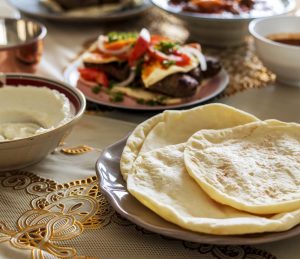By Emily Dewind
“Attention ladies and gentlemen. Because of the Islamic holiday of Ramadan, an international day of fasting is taking place today. Eating and drinking of any kind will not be permitted in public. Thank you.” This was the cheerful announcement made through the thick accent of a flight attendant upon my arrival in Doha, Qatar, this past May.
 Sitting next to me was my roommate, Julia, who did not seem particularly impressed at the prospect of refraining from food after a 12.5-hour flight from Johannesburg, South Africa. Although Qatar airlines was more than satisfactory in terms of amenities we had both looked forward to grabbing some Middle Eastern food before the 15-hour plane ride back to Atlanta. My roommate is from France, and is definitely a far more traveled individual than I am, and yet she seemed to be more surprised at the announcement. “I don’t understand Islam,” Julia remarked, and at that moment I was reminded of the time I had spent studying that very idea in high school.
Sitting next to me was my roommate, Julia, who did not seem particularly impressed at the prospect of refraining from food after a 12.5-hour flight from Johannesburg, South Africa. Although Qatar airlines was more than satisfactory in terms of amenities we had both looked forward to grabbing some Middle Eastern food before the 15-hour plane ride back to Atlanta. My roommate is from France, and is definitely a far more traveled individual than I am, and yet she seemed to be more surprised at the announcement. “I don’t understand Islam,” Julia remarked, and at that moment I was reminded of the time I had spent studying that very idea in high school.
When I tell people I went to a classical Christian school they often ask, “What is that?” or “How is that different from regular school?” These questions always resonate with me because, if there is not a difference, then what is the point? Was it worth the extra time spent studying or taking required classes with names that other high school students had never even heard of? I could tell them that I was better prepared to transition into college than a lot of my university friends in Tennessee, or that my knowledge of Latin has made memorizing biology terminology a breeze. Those things would be true. But I think that the real difference, the real benefit of my classical Christian edu- cation, is that it bridged the gap between learning and faith.
Proverbs 4:11 says, “I instruct you in the way of wisdom.” Because of Libertas, I believe my faith is what gives learning its purpose. I love learning and strive to be a lifelong learner because I see every aspect of the process as understanding a piece of God’s mind. Understanding topics like math, language, science, and art is understanding bits of who God is. That’s why He gave them to us, but it doesn’t stop there. Each one of these topics contributes in unique ways that are specific to diverse worldviews and cultural perspectives.
its purpose. I love learning and strive to be a lifelong learner because I see every aspect of the process as understanding a piece of God’s mind. Understanding topics like math, language, science, and art is understanding bits of who God is. That’s why He gave them to us, but it doesn’t stop there. Each one of these topics contributes in unique ways that are specific to diverse worldviews and cultural perspectives.
This is a significant piece of what made my classical Christian education so valuable; it not only provided me with a biblical understanding of course material, but also taught me to ask bigger questions and traverse the expanse of our humanity. Although we are all human, the very idea of humanity itself has profoundly different connotations for varying people groups around the globe.
Personally, I don’t think it is necessarily an ignorance of Islamic culture that made the circumstances that day so puzzling to many people, but rather a sort of ignorance of religion as a whole. As Christians, we often tend to think of religion only in terms of our personal beliefs, when in actuality religion is an incredibly vast and complex idea. I am not implying that Christianity should be generalized in our personal faith. However, I do think we have a tendency to narrow our perspectives and focus on what we see as directly related to us. Sometimes ignorance really is bliss.
As a high school student at Libertas, I took two years of apologetics classes from Mr. Davis. Although I thoroughly enjoyed every moment, I had no idea the long-term effects these classes would have on my life post-graduation. The skills I was equipped with in high school have served me countless times, from standing up to progressive college professors all the way to winsomely sharing my faith in a Zimbabwean hut!
This approach to education was worthwhile to me because it grew me both spiritually and culturally. My faith was so fervently affirmed in high school that I don’t have to struggle with questions that come up in college, because I already know the answers. Being equipped with knowledge is the most important earthly gift anyone could have given me, because it is a gift that keeps on growing.
As a result of my academic upbringing I have had the privilege of world traveling while in college, which is how I ended up in Doha during Ramadan. Before I ever set foot in South America, Africa, or Asia, I was culturally and intellectually informed. Although I never cease to be intrigued by events such as those I encountered in Qatar, I am not confused by them. That was the true beauty of my classical Christian education. It prepared me not just to go on to college, it prepared me to go on to the world.
 EMILY DEWIND graduated from Libertas Christian School, Hudsonville, MI.
EMILY DEWIND graduated from Libertas Christian School, Hudsonville, MI.










